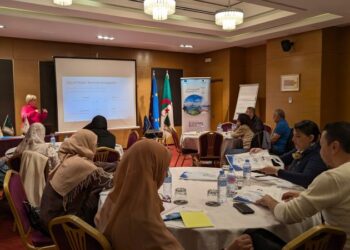Young Climate Leaders Concluded Nairobi Climate School in Addis Ababa Ahead of ACS2 _From August 25 to September 6, 2025, over 200 young climate leaders from more than 60 countries gathered in Addis Ababa, Ethiopia, for the fifth Nairobi Summer School on Climate Justice (NSSCJ). Hosted by the Pan-African Climate Justice Alliance (PACJA) at Addis Ababa University, the program provided a dynamic platform for youth to explore solutions to Africa’s most pressing climate challenges. The school combined intensive learning, practical workshops, and networking opportunities, culminating in a celebration of graduation and readiness to influence the Second Africa Climate Summit (ACS2).

A Hub for Knowledge, Skills, and Action
NSSCJ positioned itself as more than a traditional educational program. Over the course of nearly two weeks, participants were immersed in a transdisciplinary curriculum designed to equip them with actionable skills in climate finance, policy advocacy, and grassroots mobilization. The school emphasized not only understanding climate challenges but also crafting practical solutions that could influence decision-making at local, national, and continental levels.
The program also fostered intergenerational dialogue, connecting youth with academics, policymakers, and civil society leaders. These interactions allowed participants to gain insights into policy processes, advocacy strategies, and innovative approaches being implemented across the continent, while also sharing their own perspectives and experiences from their communities.
PACJA Executive Director Mithika Mwenda explained,
“The Nairobi Summer School was not just about education; it was about building a collective voice. By training and uniting these young leaders here, we ensured they are ready to influence ACS2 and beyond.”
Exploring Key Tracks and Thematic Areas
Participants engaged in specialized tracks tailored to Africa’s urgent climate and development priorities:
-
Climate Security: exploring the links between climate shocks, conflict, and migration, and identifying strategies for building resilience in vulnerable regions.
-
Water: addressing adaptation challenges in a water-scarce continent, including sustainable management, conservation, and community-led solutions.
-
Gender & Justice: centering women and youth in climate action, highlighting inclusive strategies for empowerment and equitable development.
-
Faith: Examining the role of values, ethics, and spiritual leadership in driving climate action and fostering sustainable practices.
While each track focused on a specific area, all shared a common mission: advancing climate justice across Africa. Participants were encouraged to analyze the interconnectedness of these issues and develop holistic solutions that address the root causes of climate vulnerability.

Hands-On Learning and Campaign Skills
A major feature of NSSCJ was its emphasis on practical skills and action-oriented learning. Participants explored how to design campaigns that capture the attention of decision-makers, focusing on three key pillars:
Clear asks that define objectives and expected outcomes
Solid evidence backed by research and data
Smart tactics, ranging from sit-ins and community mobilizations to engaging with embassies and policymakers
In addition to campaign training, participants engaged in experiential activities such as tree planting, which allowed them to connect theory with tangible action. Each tree planted symbolized hope, resilience, and the collective responsibility of youth to safeguard the environment. The activity also fostered a sense of solidarity and community among participants, strengthening the bonds of Cohort V across borders and cultures.
Collaborative Learning and Peer Engagement
Throughout the program, NSSCJ participants actively engaged in debates, group work, and scenario-based exercises. They tested ideas, challenged assumptions, and collaborated to develop innovative solutions to climate-related challenges. Peer-to-peer learning was a cornerstone of the school, enabling participants to gain new perspectives, build networks, and cultivate lasting friendships across countries and regions.
The school also emphasized mentorship and guidance from experienced leaders. Through interactive sessions with experts in climate policy, finance, and advocacy, participants gained insights into real-world challenges and opportunities for scaling youth-led initiatives.

Graduation and the Start of Youth-Led Change
The program concluded with a graduation ceremony celebrating NSSCJ Cohort V. Over 200 young leaders completed the program, leaving with not only knowledge and skills but also a strengthened sense of purpose and commitment to climate action.
During their two weeks at NSSCJ, participants had:
-
Debated the roots of climate justice
-
Developed and refined actionable solutions to pressing climate challenges
-
Built solidarity and networks across countries and regions
-
Explored practical approaches to influencing policy and decision-making
“This isn’t the end — it’s the start of youth-led change,” organizers emphasized.
NSSCJ graduates are now equipped to lead initiatives in their communities, influence continental policy discussions, and ensure that youth voices remain central at ACS2 and beyond. The impact of Cohort V extends far beyond the classroom, as these leaders carry their experiences, insights, and networks into Africa’s climate movement, driving action toward a just, sustainable, and resilient future.
Young Climate Leaders Concluded Nairobi Climate School in Addis Ababa Ahead of ACS2








